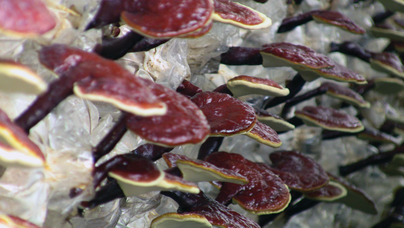
For over 2000 years, Reishi mushrooms (Ganoderma lucidium) have been considered by the Chinese to be a high quality herbal medicine. In traditional Chinese medical theory, Reishi or Lingzhi is among the highest ranking . It improves overall health, increases the body's healing ability, promotes longevity and does not cause any side effects even though it is taken continuously. According to Li Shi-Zhen, the famous physician and pharmacologist in Chinese history, long-term consumption of Reishi will promote a strong and healthy body and assure longevity. It has been proven by modern medical research that Reishi has a wide range of beneficial effects. Its main function is to promote blood circulation and increase the metabolic activities of cells (detoxification) and also helps with the proper functioning of all internal organs (balance the body functions).
Important elements found in Reishi
Through modern scientific analysis, there are more than 300 active elements found in Reishi. The main active elements are:
i) Polysaccharides
Polysaccharides stimulate or modulate the immune system by activating the immune cells such as macrophage and helper T-cells as well as increase the levels of immunoglobulin (antibodies) in fighting the unwanted foreign cells such as bacteria, viruses etc. It helps to cleanse the toxins from the body, strengthen the natural healing ability of the body, convert abnormal cells into normal cells and strengthen the resistance of the body thus improving overall health. Experiments at the Drug Research Institute in Toyama, Japan confirmed that polysaccharides in Reishi are responsible for immune enhancement. In Japan, Reishi extract has been reported to be effective in treating patients with liver failure.
ii) Triterpenoids
Triterpenoids are responsible for Reishi´ss bitter taste and several of its beneficial properties. This component improves blood pressure and increases blood lipids. Triterpenoids have a kind of harmonizing effect on the body especially on the immune and the circulatory system. It gives Reishi an adaptogenic quality, providing the person with protection from a wide range of biological, environmental and social stresses.
iii) Adenosine
Adenosine improves blood circulation by inhibiting blood platelet aggregation. An earlier study done by a team of researchers from Beijing College of Traditional Chinese Medicine found that Reishi improved the function of red blood cells in transferring oxygen. They related this finding to the adenosine in Reishi.
Adenosine also helps in lowering the cholesterol level and regulates metabolism and hence promotes vigor and vitality.
In today´s world, a large proportion of the population is constantly in the state of ´spre-illness´s due to environmental pollution, stresses and unhealthy lifestyle such as consuming diets which are high in fats, cholesterol, sugar, salt and chemical additives. Under these circumstances, it is wise to prevent any deterioration in health rather than seek a cure after illness prevails. As recorded in the oldest Chinese medical text, Reishi is to be used for preventive measures rather than a cure. Therefore, Reishi is the best solution for modern day health problems.
Important elements found in Reishi
Through modern scientific analysis, there are more than 300 active elements found in Reishi. The main active elements are:
i) Polysaccharides
Polysaccharides stimulate or modulate the immune system by activating the immune cells such as macrophage and helper T-cells as well as increase the levels of immunoglobulin (antibodies) in fighting the unwanted foreign cells such as bacteria, viruses etc. It helps to cleanse the toxins from the body, strengthen the natural healing ability of the body, convert abnormal cells into normal cells and strengthen the resistance of the body thus improving overall health. Experiments at the Drug Research Institute in Toyama, Japan confirmed that polysaccharides in Reishi are responsible for immune enhancement. In Japan, Reishi extract has been reported to be effective in treating patients with liver failure.
ii) Triterpenoids
Triterpenoids are responsible for Reishi´ss bitter taste and several of its beneficial properties. This component improves blood pressure and increases blood lipids. Triterpenoids have a kind of harmonizing effect on the body especially on the immune and the circulatory system. It gives Reishi an adaptogenic quality, providing the person with protection from a wide range of biological, environmental and social stresses.
iii) Adenosine
Adenosine improves blood circulation by inhibiting blood platelet aggregation. An earlier study done by a team of researchers from Beijing College of Traditional Chinese Medicine found that Reishi improved the function of red blood cells in transferring oxygen. They related this finding to the adenosine in Reishi.
Adenosine also helps in lowering the cholesterol level and regulates metabolism and hence promotes vigor and vitality.
In today´s world, a large proportion of the population is constantly in the state of ´spre-illness´s due to environmental pollution, stresses and unhealthy lifestyle such as consuming diets which are high in fats, cholesterol, sugar, salt and chemical additives. Under these circumstances, it is wise to prevent any deterioration in health rather than seek a cure after illness prevails. As recorded in the oldest Chinese medical text, Reishi is to be used for preventive measures rather than a cure. Therefore, Reishi is the best solution for modern day health problems.
 RSS Feed
RSS Feed